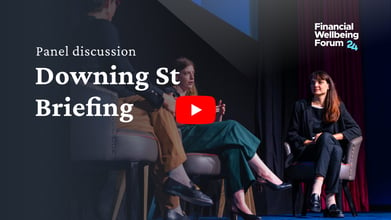Insights

How behavioural science plays a role in money decision-making
“People were coming up with custom strategies to fit what they needed - but it required constant decision-making under pressure." - Anne Angsten-Clark, Nest Insight As financial wellbeing moved up the board agenda, salaried executives unintentionally made policy decisions in a vacuum - clouded by their personal financial circumstances and lived experiences.We heard from two of the UK’s leading researchers on financial wellbeing that it’s time for a reality check.An underserved majority - 25 million people just in the UK - are earning a volatile income. Many are resorting to financial coping tactics outside mainstream financial services. Some are making as many as 150 financial decisions for their household every month. Some actively choose lower-paying jobs which offer more predictability.In world-first research, we saw how lower-income workers are underestimated by their higher-earning colleagues. Not only for their financial savviness, but their ability to find workarounds, provide for others and live a meaningful, dignified life. This can have a detrimental impact on workers, as these higher-earners are often the ones making significant workplace decisions, surrounding pay and benefits.To really understand how money works for their workforce, employers will have to confront complexity. Those who do will find direction on ways to provide far more meaningful financial support to more of their people.
Read full article
19 Dec 2024

Financial wellbeing action-plan for employers
There is much work to do - but there are clear steps employers can take, to shift their financial wellbeing strategy from words into actions. The recommendations below are practical and proven for improving financial wellbeing and you won’t go amiss by implementing as many of these as you can. Opportunity:Volatile working hours create shaky financial foundations. Lower earners are more likelyto experience volatility, and this links to worse financial outcomes. Recommendation:Aim to meet the standard for living hours, as provided by the Living Wage Foundation. The Living Wage Foundation has created a standard for employers called Living Hours. In it they outline three commitments employers should make to provide financial stability for employees. The Living Hours standard calls on employers to provide the right to: 1. Decent notice period for shifts: of at least 4 weeks’ notice, with guaranteedpayment if shifts are cancelled within this notice period2. The right to a contract that reflects accurate hours worked3. A guaranteed minimum of 16 hours a week (unless the worker requests otherwise) Opportunity:A regular savings habit is strongly correlated with better financial satisfaction and lower financial worries. Lower earners have 8x less savings than higher earners and are more likely to have £0 in savings. Recommendation:Implement a payroll savings programme and ideally structure it on an opt-out basis so that employees build up savings by default. Access to an appropriate savings product is an important component of financial inclusion. There’s a strong evidence base that payroll autosave is a highly effective way to get individuals on low and variable income to create a savings habit and start building a savings buffer. Recent research from Nest Insight shows that savings participation can reach as high as 71% of eligible employees with this approach. Wagestream has been an active participant in this savings research trial, and as such can already implement opt-out payroll savings for employers. There are also many other pathways to delivering a successful payroll savings programme. Nest Insight has written a guide for employers outlining different options for making this work, and the technical and regulatory considerations for each one. Opportunity:There’s an action gap when it comes to implementing well known financial behaviours.Individuals know what they should be doing, but struggle to make it happen. Recommendation:Review your workplace financial wellbeing programme and benefits through the lens of how action-oriented they are and prioritise providing financial security benefits that are useful and accessible for the whole workforce. Be aware that the financial circumstances and needs of the HR team who assess these offerings will often be very different from the financial circumstances and needs of the workers who use them. Focus on providing a wellbeing toolkit that’s tailored to the needs of your workforce and considers their circumstances including volatility of earnings. Financial education can be helpful, but unless it’s paired with actionable and accessible financial security tools it’s likely it will fall short of the mark. Download your copy of this action-plan. ","post_tag":"Action-plan
Read full article
15 Nov 2024

A wellbeing offering that your exec-team will love
Wellbeing? It’s a strategic fundamental. And it should be a long-term outcome of work” - Peter Cheese, Chief Executive of CIPD You won't struggle for conversation topics, the next time you're stuck in an elevator with your CEO. Recruitment. Absenteeism. Cost of living. National Insurance. Employment rights bills. And that's just the start of it, barely scratching the surface of the interconnected issues. As four industry heavyweights took to the stage, we heard a rallying cry to People leaders: take this to the board, and don't back down. The panel were united in imploring teams to start at the top, encouraging more conversations about mental and financial health from executive level downwards. This shift necessitates a cultural transformation, where wellbeing is embedded into daily operations, not treated as an afterthought. Investing in comprehensive wellbeing initiatives fosters a more resilient and engaged workforce, ultimately driving sustainable business success. Prioritising employee wellbeing is no longer a luxury, but a critical component of a thriving, modern organisation, essential for attracting and retaining top talent in today's competitive landscape. The goal? Get your organisation off the back foot, and onto the front foot. Take your wellbeing strategy from 'coping' to 'empowering' - from mitigating the wellbeing effects of your colleagues coming to work, to making their wellbeing better because of coming to work, one that demonstrates a clear return on investment and aligns with overarching business objectives.
Read full article
7 Nov 2024

Why workplace savings is a game-changer
“Everyone should be able to benefit from financial products and services which suit them - but many aren’t able to.” - Economic Secretary to the Treasury Gone are the days of financial education. Here are the days of financial action. That was the message as three leading experts on financial wellbeing, after a rousing call to arms from the UK’s Economic Secretary. The new UK Government will drive up focus on inclusion, and new research increasingly suggests most consumers do know what good financial habits look like - but can’t access the services they need, or struggle to take action.Savings could close the intent to action gap, as auto-enrolment savings moves into legislative consideration after powerful trials run by Harvard University with Wagestream, Co-op and Bupa. Take action Lean into changeAfter a decade-long vacuum of employment changes, Labour’s Employment Rights Bill is just the beginning. Turbulence is inevitable - but a raft of consultations will open up opportunities for employers who lean in and shape the new world of work Challenge preconceptionsMoney can be counterintuitive - having access to flexible pay, for example, doesn’t drive down workers’ desire to also save for the future. Meanwhile, new research highlights higher earners - who make decisions about financial wellbeing in workplaces - are underestimating the savviness of lower-earner colleagues Target ‘hard to reach’Consider that the colleagues who most need help may be the last to proactively use a helpful benefit like payroll savings, and think about new ways to engage them - like flipping the default to automatic enrolment
Read full article
29 Oct 2024

Therese Procter announced as Financial Wellbeing Forum Chair
I’m currently the Chair and co-founder of a startup organisation called MeVie, a Senior Partner with HR consultancy OrgShakers, a Global Advisor for financial wellbeing business Wagestream, and now Chair of the Financial Wellbeing Forum. I’ve been fortunate enough to be featured in the Top 15 of HR Magazine’s list of Most Influential HR Practitioners on six occasions, and have formerly been a Chief People Officer at a leading retail bank, as well as spending 30 years with Tesco PLC working across a range of HR and strategic roles. Outside of work I’m a mother of two wonderful daughters, and my hobbies are all about being active and keeping moving – cycling, running, trekking, you name it. I’m also big into fundraising; I’m planning to embark on a climb up Kilimanjaro in January to raise money for the Breast Unit for The Princess Alexandra Hospital NHS Trust, so I’m currently training for that adventure! Why have you decided to take on the role of Chair for the Financial Wellbeing Forum? Financial wellbeing has always been a passion of mine. I’ve spoken on, written about, and worked with companies that are dedicated to improving the financial wellbeing of people, and I think that it’s so important for there to be a platform where this knowledge can be shared and accessed by all. This is why when I was asked to be Chair for the Financial Wellbeing Forum (FWF) I didn’t hesitate in accepting. The FWF are dedicated to sharing such important thought-leadership that will help to improve people’s financial literacy and educate them around better supporting their own financial wellbeing, and I couldn’t be more honoured to be a new addition to their organisation. And the fun doesn’t stop there, because I will also be chairing their annual Financial Wellbeing Forum event taking place this October. It is such a privilege to be able to convene with such a distinguished group of experts and organisations and discuss the importance of financial wellbeing in detail.","post_tag":"Leadership
Read full article
3 Sept 2024

Why scarcity-alleviating benefits improve business outcomes
Financial wellbeing benefits are playing an increasingly important role in supporting employees with all aspects of budgeting, saving, and education, but they can equally support in flipping the scarcity mindset, alongside tweaks to workplace policies and processes. 1 in 5 workers need help with commuting costs The challenge: An increasing amount of external research confirms a correlation between absenteeism and financial stress. There are many factors that might play a role in this, but one that is often overlooked is the cost of the commute, which might be driving workers to extreme measures - such as calling in sick. The difficulties and expense that the work commute presents may not be immediately apparent to those who work a 9-5 office job, where transport options are far more varied and available; however, deskless workers are often working unusual shift patterns, evening and night shifts, and public holidays - and can be left short of choice. Take a nurse who is working the night shift at a hospital, finishing in the early hours, which potentially leaves a taxi home as their only transport option - this is where the cost of commuting becomes a burden, and absenteeism becomes a viable option to tackle fears of financial scarcity. The plan: The UK’s largest, most in-depth study into flexible pay, revealed that 22.1% of people use flexible pay to cover the cost of their commutes. This finding highlights a universal expense that is often overlooked. Internal policies and benefits are usually built to support colleagues in the workplace, but do those policies support them in reaching work in the first place? Even small changes to policies and processes can make a really positive difference to teams; for instance, the frequency with which expenses are reimbursed, or overtime is paid. Flexible work is also becoming a popular term, which covers a lot of different working arrangements; but again, even slight tweaks, such as a allowing some flexibility to shift starts/ends, and having a straightforward system of swapping shifts, can potentially save workers time and money on their commutes, and flexibility on necessities like childcare. Additionally, flexible pay is a powerful financial tool when it comes to necessary expenses, like travel. Particularly in instances of overtime shifts or over-running hours, where extra costs crop up unexpectedly, having flexible access to pay can help mitigate the fears of financial scarcity that drive behaviours like absenteeism. ","post_tag":"Research
Read full article
22 Jul 2024
Insights

The home of financial wellbeing
Financial Wellbeing Forum is supported by Wagestream - the platform 1,000 employers use to power their financial benefits. Book a free call with one of their financial wellbeing consultants, to find out more.

About us
The Financial Wellbeing Forum brings together the world’s leading experts on employee financial wellbeing to bring you groundbreaking research, world-class events and thought-provoking content on wellbeing at work.












-4.png?upsize=true&upscale=true&name=Mask%20group%20(1)-4.png)
-2.png?upsize=true&upscale=true&name=Mask%20group%20(2)-2.png)
.png?upsize=true&upscale=true&name=Mask%20group%20(10).png)
-2.png?upsize=true&upscale=true&name=Mask%20group%20(3)-2.png)